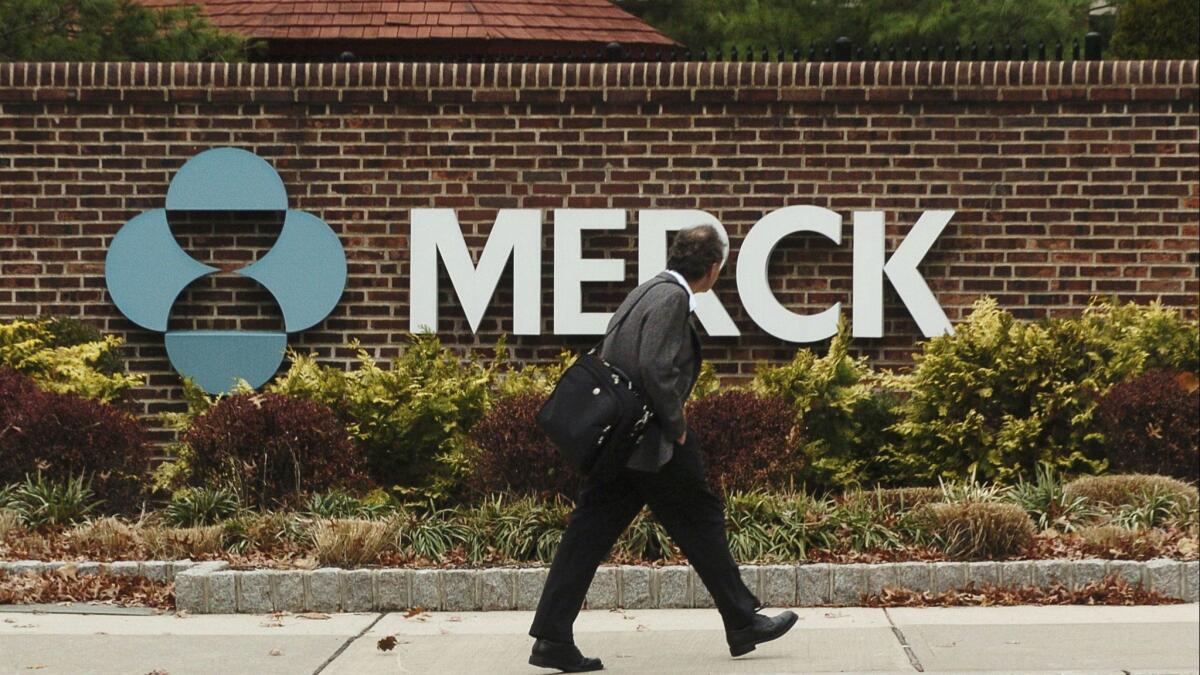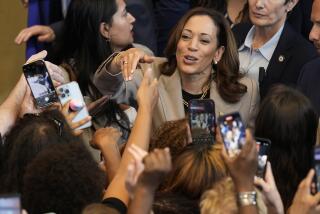Column: Merck joins the parade of Big Pharma companies offering Trump bogus cuts in drug prices

The big drug company Merck, scurrying to get on President Trump’s good side on drug prices, announced Thursday a raft of initiatives aimed at showing its “commitment to responsible pricing.”
The company said it would lower the price of its hepatitis C treatment Zepatier by 60% and cut prices on six other drugs by 10%. Merck also pledged to not increase the average net price of its overall product portfolio by more than the inflation rate annually.
Hold your applause.
It’s counterproductive if the industry is saying it wants to help but really is just pretending.
— Walid Gellad, University of Pittsburgh
Not a single one of these initiatives will do anything significant to lower prices or even stem the rise in key products. The pledge on average net prices amounts to a huge loophole allowing Merck to hike the price at will of the drugs it really cares about. In other words, this is a bogus commitment, just like Pfizer’s pledge a few days ago to roll back some of its recent price increases … temporarily.
The drug industry’s desire to meet Trump’s demand for lower prices is understandable. What company wants to be in the crosshairs of the tweeter-in-chief? But offering price cuts with imaginary impacts isn’t going to cut it in the long run.
“What Merck did was not of much benefit at all,” says Walid Gellad, an expert at pharmaceutical policy and pricing at the University of Pittsburgh. “In fact, it’s counterproductive if the industry is saying it wants to help but really is just pretending.”
Let’s open up Merck’s announcement to find the pretense. First, Zepatier. This product has been an also-ran in the shrinking market for hepatitis C cures, badly trailing Gilead Sciences’ Harvoni and Sovaldi even though its list price of about $54,000 is almost half their list price. But the Gilead products have been heavily discounted, in part to meet the competition from Merck and AbbVie, the maker of another hepatitis C drug, and in part because these formulations are so effective as cures that the available patient pool is falling fast.
Zepatier sales peaked last year at about $1.7 billion and had fallen so low by the first quarter of this year that the company essentially listed the drug’s U.S. sales in its quarterly financial report as zero. Sales of Gilead’s hepatitis C products, by contrast, peaked in 2015 at $19.1 billion. They’ve fallen every year since, but the company still dominates the market.
Even with a 60% price reduction, Gellad conjectures, the list price of Zepatier will still be higher than most insurers are paying for it now.
As for the other six drugs cited by Merck, lower-priced generic versions of all of them have been available for years, including Prinivil, a medicine for high blood pressure on which Merck’s patent expired in 2002. As Merck acknowledges in its financial disclosures, the introduction of generic competition for a drug “typically leads to a significant and rapid loss of sales for that product.” Umer Raffat, a drug industry analyst at Evercore ISI, calculated that the six drugs account for less than 0.1% of Merck’s $40 billion in annual sales, according to statnews.com.
Merck seemed to acknowledge in its announcement that it chose drugs on which the price reductions would be almost invisible on the bottom line. It said its product selections “were based on a range of factors including the gap between list price and actual discounted (net) prices paid in the market.” In other words, the reductions may have brought the list prices down to what Merck was receiving from payers anyway, after discounts.
Finally, there’s Merck’s pledge to hold the average net price increase on its overall portfolio to the rate of inflation. “That’s not of much benefit at all,” Gellad told me. “That is utterly confusing and probably not having a big impact at all, when you look at what really matters to people.” By limiting its cost increases on a portfolio-wide basis, he says, Merck leaves itself the opportunity to raise prices on individual drugs.
What’s most important is that Merck made no commitments on the products that actually are important to its bottom line — blockbusters such as the diabetes drug Januvia, which accounted for nearly $6 billion in sales last year, and Keytruda, a cancer drug that brought in $3.8 billion. Together, those two drugs accounted for roughly 25% of Merck’s total sales. Merck has raised the price of Januvia by more than 18% since January 2017.
Gellad says there’s reason for optimism in some of the Trump administration’s policy prescriptions on drug pricing. The administration reportedly is contemplating rules to discourage rebates that often prompt drugmakers to raise prices, in favor of fixed discounts that wouldn’t have the same effect. The administration’s focus on drug prices is a positive development, he says, even if it has resulted in misleading initiatives by the companies thus far.
“Where they’re trying to make fundamental changes in the law or regulations or the business environment is good,” Gellad says. “The last thing we want as a society is to implement policy change because the president is pressuring private businesses. That’s not what should be celebrated.”
Keep up to date with Michael Hiltzik. Follow @hiltzikm on Twitter, see his Facebook page, or email [email protected].
Return to Michael Hiltzik’s blog.
More to Read
Inside the business of entertainment
The Wide Shot brings you news, analysis and insights on everything from streaming wars to production — and what it all means for the future.
You may occasionally receive promotional content from the Los Angeles Times.











